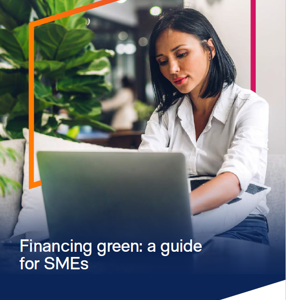With firms shifting to green business models, we look at industry examples of how sustainable finance can pay the way to decarbonisation.
COP26 arrives at a pivotal moment in the transition to a decarbonised economy. Businesses are working to seize the moment of post-pandemic recovery and accelerate the road to net zero. Each aspect of sustainable business has its part to play in the green transition, including how to finance the step changes required to move that journey forward.
To shed some light on the types of funding, the innovative projects, and the bespoke financing opportunities available to businesses seeking to fund sustainable investments, we looked at four projects and companies and the impact that secure financing has had in propelling them forward.
Edwardian Hotels’ The Londoner receives a Green Loan from HSBC to become London’s greenest hotel
A privately-owned firm operating 12 hotels in London and one in Manchester, Edwardian Hotels’ latest project had the bold ambition of being London’s greenest hotel. To realise that, the project needed to achieve the Building Establishment Environmental Assessment Method (BREEAM) “Excellent” status of accreditation.
Financing was secured via a Green Loan from HSBC, allowing the developers and engineers to fit The Londoner with sustainable solutions such as mixed-mode ventilation, smart control systems for every room, LED lighting throughout the entire hotel, and efficient water fittings. The Londoner is designed to use 30% less carbon than regulations demand and to connect to future low/zero carbon heat networks.
Edwardian Hotels responded to the growing trend among guests and businesses to seek out hotels that are committed to sustainability, designing The Londoner to be future-proofed in the evolving marketplace. Achieving the accreditation of “BREEAM Excellent” combined with a Green Loan compliments The Londoner’s sustainability proposal and provides a competitive advantage.
While sustainability is currently an attractive amenity for customers it will soon become an expectation. Edwardian Hotels believe that if any business is building a new product or wanting to invest in an existing one, then sustainability should be integrated into its thinking from the outset.
Sustainable car company Riversimple benefits from Barclays and Unreasonable Group’s support programme for sustainable businesses
It is estimated that the global economy will need over 300 million new jobs to accommodate current unemployment, supplement projected job losses resulting from automated industries, and provide opportunities for the next generation.
In response to that challenge, Barclays teamed up with Unreasonable Group – an international company that supports a fellowship for growth-stage entrepreneurs, channels exclusive deal-flow to investors, and partners with institutions to discover profit in solving global problems. Together they launched Unreasonable Impact, an international network of accelerators focused on scaling up entrepreneurial solutions that will help employ thousands worldwide.
One firm to benefit from the programme is Riversimple – a sustainable car company manufacturing hydrogen-powered fuel cell electric vehicles. Riversimple participated in the 2016 Unreasonable Impact UK and Europe programme where it had access to mentors – including experts from Barclays – to help it scale. The programme also gave Riversimple the opportunity to participate in Demo Days and other flagship events, showcasing its sustainable impact and building connections across industries and sectors to facilitate its growth.
Unreasonable Impact now consists of over 200 ventures supporting more than 125,000 jobs in sustainable industries in more than 180 countries. Collectively, more than 16m units of products with sustainable features have been sold, contributing to more than 48m tonnes of greenhouse gas emissions being reduced and more than 400m kgs of waste avoided or diverted from landfills.
Crop lifecycle management firm Rovensa expands its ESG credentials with the support of private equity firm Bridgepoint
Rovensa provides solutions that promote sustainable agriculture, targeting plant health and crop yields through a broad range of R&D-led biological products. It was acquired by Bridgepoint in 2017. The investment case was underpinned by the increasing demand for food driven by population and lifestyle changes with a need for sustainable solutions.
Bridgepoint saw several areas in which its investment could focus on improving Rovensa’s ESG credentials and move it towards more sustainable products using natural ingredients and biodegradable compounds and microorganisms as alternatives to chemicals.
Rovensa established a BioControl division in 2018 with the acquisition of Idai Nature and has strongly grown its Bio-operations. As part of Rovensa, Idai was recognised by the European Commission at the 2020 Annual European Business Awards for the Environment in 2020 for successfully placing a new product or service that makes an outstanding contribution to sustainable development.
Bridgepoint also turned its eye to Rovensa’s ESG governance and worked with the management team to significantly improve its policies and procedures, including supporting the production of Rovensa’s first sustainability report in 2021. Alongside stringent environmental controls at its facilities, including state of the art fire and dust suppression systems and waste-water recycling, Rovensa has continued to reduce waste and eliminated cardboard usage at one of its subsidiaries. These measures delivered a tangible financial impact alongside clear environmental benefits.
To date, seven of 12 manufacturing facilities have been converted to 100% green renewable energy with the aim to convert all the remaining facilities in due course.
Derwent London establishes the UK’s first revolving credit facility with the help of HSBC, Barclays, and NatWest
With 5.4 million sq. Ft of real estate in its portfolio, Derwent London is the largest London-focussed real estate investment trust (REIT). Derwent London has been pioneering sustainable initiatives in its investments and developments for some time. But to be a truly sustainable business, Derwent London knew this needed to be incorporated across all its operations – including finance.
That is why the group established the UK sector’s first revolving credit facility (RCF) with a green tranche in 2019. At the time, there were no precedents or guidance on creating a robust green framework to clearly demonstrate the use of proceeds on projects which deliver a significant improvement in a building’s long-term sustainability.
Whilst the LMA Green Loan Principles set out high-level guidance, Derwent London, with HSBC, Barclays, and NatWest had to develop a new framework that was robust, transparent and clearly linked the use of proceeds from the RCF to meaningful sustainability activities. It also needed to meet the standard requirements of its lenders.
Derwent London’s green finance framework set clear parameters on what that finance can be used for. New developments must achieve BREEAM ‘Outstanding’ or ‘Excellent’ and refurbishment must raise a property’s EPC rating by at least two grades.
Derwent London believes that utilising green financing is a great way to start any net zero journey. Greening a business’s finance clearly demonstrates its intentions and commitment to investors and strengthens its relationships with wider stakeholders.
Vital Energi scales up its operations to meet the increasing demand for distributed clean energy with the investment from Scottish Equity Partners
Vital Energi designs, installs and operates low carbon energy generation and distribution solutions. It also provides tailored energy management schemes to measure, monitor and reduce energy consumption. Some of its projects include the UK’s largest water source heat pump heat network scheme at Queens Quay and major city-wide heat network schemes in Leeds, Manchester and in London boroughs.
The business required investment to scale to meet the increasing demand for distributed energy. Already established in the UK heat sector, it was seeking to accelerate the implementation of the latest technologies and diversify into adjacent sectors, including the installation of proprietary heat interface units and the development of energy from waste systems.
Since seeking investment from a private equity fund Scottish Equity Partners, Vital Energi has grown into the UK market leader, trebling turnover since 2015, with further growth projected in the increasing demand for heat decarbonisation. It is developing its expertise and presence across the clean energy and heat sectors and is now in an ideal position to contribute to the UK’s decarbonisation ambitions.



